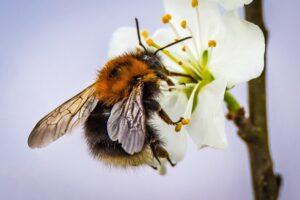The quality of the fruits also depends on the presence of pollinating animals
Almost a quarter of the quality of fruits depends on the presence of pollinating animals, animal pollination plays a key role in determining the quality of agricultural production – concluded researchers from the University of Padua and the Eötvös Loránd Research Network Ecological Research Center (ELKH ÖK).

(Photo: Pixabay)
Elena Gazzea and Lorenzo Marini, researchers from the University of Padua, and Péter Batáry, the scientific advisor of ELKH ÖK, have quantified the impact of natural pollinators on the quality of crops on a global level for the first time during research based on the statistical method of meta-analysis – ELKH informed MTI on Friday. According to their statement, the results show that animal pollination plays a key role in determining the quality of agricultural production. Fruits pollinated by animals are on average 23 percent better quality, so the quality of the fruit depends on the presence of pollinating animals for almost a quarter.
A study on the research was published in the prestigious scientific journal Nature Communications
As the announcement reminds, pollinating organisms are essential for the reproduction of many plant species, including many plants used in human nutrition, including fruits and vegetables. In temperate environments, pollinators are mainly insects, including bees, butterflies, many dipterans such as hornets, and some beetles, while in tropical and subtropical regions this group includes birds, bats, and some other mammals.
In recent decades, the diversity and numbers of many pollinating species have decreased worldwide, this phenomenon is the pollination crisis or pollination crisis
Scientific efforts have therefore focused on quantifying the importance of these organisms in agriculture, and numerous experimental studies have been conducted on their impact on crop yield, production stability and crop quality, the announcement recalls. The aim of the research Global meta-analysis shows reduced quality of food crops under inadequate animal pollination was to quantify the impact of pollinators on the quality of crops on a global scale for the first time. For this, the statistical method of meta-analysis was used, which enabled a quantitative synthesis of the literature on the topic. The data were collected through a systematic literature search in the main databases of scientific publications, for which data from 190 independent studies conducted in 48 countries and 48 different crops were used. The effect of animal pollination was quantified by comparing the differences in the quality of fruits grown with and without pollinators – in terms of shape, size, appearance, taste and nutritional properties.
The results show that animal pollination plays a key role in determining the quality of agricultural production
Fruits pollinated by animals are on average 23 percent better quality, so the quality of the fruit depends almost a quarter on the presence of pollinating animals – summarizes the announcement of the ELKH. According to the researchers, animal pollinators mainly positively influence the sensory properties of fruits and vegetables, such as shape and size, as well as their post-harvest durability, while they contribute less to nutritional properties and taste. The quality benefits of animal pollination are independent of geographic region and pollinator species The data analyzes also revealed signs of suboptimal pollination, which could result from a decrease in the number of pollinators in agricultural landscapes and could threaten crop quality. However, the use of pollinators similar to honey bees maintains the best quality fruit and vegetable production, the research concluded. “The quality of unprocessed foods, such as fruits and vegetables, is based on standards that are primarily related to their appearance and shelf life. As a result of suboptimal pollination, abnormal fruit and vegetable crops affect the entire agricultural production chain, from farmers’ income to consumers until they decide whether to buy the product or not,” the publication quotes Péter Batáry. The researcher emphasized: the cultivation of imperfect and short-lived fruits therefore increases the wastage of nutrient-rich foods and unnecessarily burdens agricultural land. Elena Gazzea, the first author of the study, pointed out that the global decline of pollinators threatens not only crop yield and its spatial and temporal stability, but also the quality of agricultural production. “The link between animal pollination and food waste has so far been almost ignored by agri-food policies, even though it has important economic, social and environmental consequences, especially in an age when the consumption of nutrient-rich foods worldwide is not optimal,” stressed Elena Gazea.
MTI
Related news
KSH: industrial production decreased by 0.2 percent in October
In October, the volume of industrial production fell by 0.2…
Read more >Prices rose by 3.7% in November
Following a 3.2% year-on-year increase in October, consumer prices in…
Read more >The Ministry of Agriculture has issued a notice on the use of ENAR data in support policy
In the case of animal-based subsidies financed from EU funds,…
Read more >Related news
Recognition of Consumer Protection Excellence: Honoring the Best of 2024
This year’s outstanding consumer protection officers and special award recipients…
Read more >The Joy of Giving! – SPAR stores collect non-perishable food for people in need
The Hungarian Maltese Charity Service and SPAR Hungary have launched…
Read more >KSH: industrial production decreased by 0.2 percent in October
In October, the volume of industrial production fell by 0.2…
Read more >







